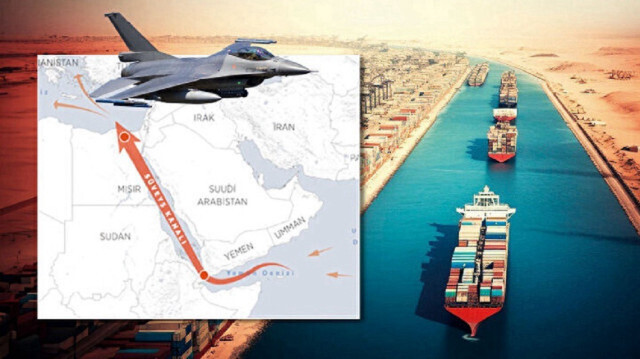The ongoing genocide carried out by Israel has raised tensions in the region after Yemeni Houthis announced their intention to target ships passing through the Red Sea to reach Israel. As a result, the number of ships passing through the Canal has decreased, affecting global economic stability. The effects of the reduced ship traffic, coupled with the skyrocketing ship insurance premiums, have exacerbated the economic crisis, particularly concerning for Israel, which is heavily reliant on trade via the Suez Canal.
The closure of the Suez Canal due to conflict would result in significant economic losses not only for Israel but also for the United States and European countries.
The prolonged genocide by Israel against Palestinians, ongoing since October 7, has not only led to a humanitarian crisis but also disrupted the global economic system.
Following Israel’s attacks, Yemen’s Houthis declared their intention to target ships heading to Israeli ports by passing through the Red Sea.
Since November 19, the Houthis have targeted several ships heading to Israel, dealing a severe blow to the trading artery reliant on the Suez Canal. The region, home to the Red Sea and the Suez Canal connecting it to the Mediterranean, has become a battleground due to the influence of Israel and the Zionist lobby, as well as the maritime protection force established by the United States against the Houthis.
Global Economy Faces New Crisis: Ship Insurance Premiums
The flames of this battleground have ignited a major crisis in global trade.
The Suez Canal, spanning 193 kilometers and connecting the Red Sea to the Mediterranean, facilitates about 12% of global trade. However, tensions resulting from Israel’s massacres have led to a decrease in traffic through the Suez Canal.
Daily ship crossings through the canal have decreased by approximately 40% in the past two months. While the reduction in ship traffic poses a significant problem for global maritime trade, it has also led to an increase in ship insurance premiums, further exacerbating the economic crisis.
Ship Insurance Premiums Increase Up to 10 Times
Due to the escalating tension in the Red Sea, premiums demanded for war risk insurance in the region have begun to rise.
It is noted that the war risk premium may be the largest component of the insurance cost for a ship that may go to high-risk areas, and after the Gaza attacks, it was learned that the additional war risk premiums that ships visiting the region’s ports will pay have increased up to tenfold.
What Factors Determine Premiums?
Various factors are considered in determining ship insurance premiums.
While each insurance company sets its pricing based on its risk perception, factors such as whether the ship has kidnap or ransom insurance and additional security measures on board are taken into account.
Ever Given Incident Changed Insurers’ Perspective
Furthermore, it was learned that insurers’ view of canals turned negative after the incident in the Suez Canal caused by the tanker ship named The Ever Given, which closed the canal for days and negatively impacted global trade.
The ‘Independenta’ Disaster in the Istanbul Strait Brought Global Trade to a Halt
The ‘Independenta’ disaster in Istanbul in 1979, one of the world’s most important trade routes, had brought global trade to a halt for days.
The Romanian-flagged Independenta, loaded with 95,000 tons of crude oil from Libya and heading to Romania’s Constanta Port, collided with the Greek-flagged Evriali, a dry cargo ship coming from the Black Sea, off Haydarpasa in the early hours of November 15.




































